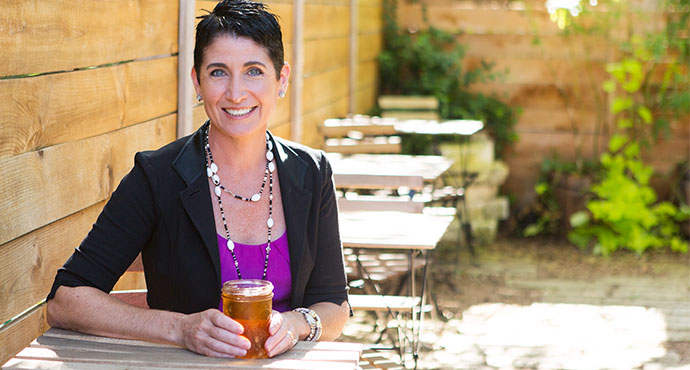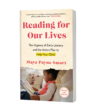It’s hard for domestic violence victims to see a path to safety, let alone travel it. They have to survive the violence itself, overcome the guilt, shame and alienation it causes, and risk death or injury to escape. They have to secure shelter, food and clothing and navigate a mire of legal proceedings to distance themselves from their abusers. Often with few resources and little hope.
When we think of someone escaping abuse, the red tape of protective orders, divorce, custody, name changes or emancipations aren’t the obstacles that spring to mind. Yet legal services are among the most powerful tools to get—and stay—out of a violent relationship for the long term, says Heather Bellino, executive director of the Texas Advocacy Project. They are crucial to giving victims the space and security they need to forge new, better lives for themselves and their children.
Bellino leads a non-profit law firm that provides these services free of charge to the people who need them most. And she’s on a mission to raise community awareness of the legal side of survival so that victims know where to turn and their supporters are better informed to assist. I toured her office and interviewed her to help spread the word.
How do legal services help end violence?
It takes between 7 and 9 times for a person to leave their batterer before they’re able to make that permanent break. When they do go to make that permanent break, it also unfortunately is the most lethal time.
All of these court orders and documents really make that long-term goal of getting and staying safe possible. For example, a person with a protective order is 80% less likely to be re-victimized. It helps to have the proper custody agreements where they have conservatorship over their children because a batterer often uses children against the victim. Being able to get a divorce from the batterer obviously is a hugely important component to being able to live free from harm.
When they get through that, they are permanently able to stay out of that relationship, because they have the court orders and documents that state he’s not allowed to come near her anymore. She is legally allowed to live without him and in a different place. She can legally have the right to have their children with her and not with him. He is mandated to pay child support, so she doesn’t have to live on the street, even though he told her he would never give her money to support the children if she tried to leave him.
Can you describe some of the legal services that Texas Advocacy Project offers?
The services that we provide wrap in a continuum of care, anywhere from brief advice and legal counsel on our phone lines — basically where, if you call in and you are facing an issue, and you need services, we direct it towards specifics towards your case. The family code here, for example, states that a district attorney or a county attorney’s office is supposed to supply a protective order. We give you all of the information you need, and we tell you what sort of documents will be requested. We tell you what that process is going to look like. Then we refer you out until you get those protective orders.
If that is not going to work in your case, then we bring you into our services, and we work with you to get the protective orders that you need. We do that through Assisted Pro Se services, where people can self-represent, meaning that we provide all of the court documents to them and give them a really good view of what’s going to happen. Basically, it’s kind of a scripted out day. You’re going to go to the courthouse. It has a red brick building. You’re going to go up three flights of stairs, turn to the left. The guy with the cowboy hat, hand him this piece of paper. Walk in and say this to the judge, show him what your papers say, and then you’re able to get your protective order or your divorce. That’s through representing yourself.
I love that particular process when it is appropriate for that individual because it’s very empowering. As you can imagine, if you’ve been a victim of violence over a period of time, the perpetrator has taken away all of your self-esteem, all of your ability to have any control over your own environment or your life. To be able to go into court, which is intimidating no matter what the circumstances are, and to be able to say, “I deserve safety, and I deserve freedom, and I deserve to live free of fear,” and have a judge agree with you and give you the orders that you’ve requested is an amazing feeling for our clients.
We do that, and then we also do direct representation where justice demands. If for whatever reason, you’re unable to get that protective order pro se, then we’ll go in and represent you so that we can help you to get those orders immediately. Sometimes that actually is in response to a critical unmet need in a specific area of Texas. As you can imagine, access to protective orders is uneven, based on the resources that each county or each area has. Occasionally the reason why you’ve been denied is that they don’t actually understand the code in that area, or they’re choosing to perhaps just not uphold it in that area. We’re able to go in and say, “Okay, this is the way it’s supposed to be done. This is what it is according to law. Please fix your issue.” If not, then we go in and litigate so that they’re able to get that issue fixed.
What attracted you to this work
To be honest, I stumbled upon it. It was not something that I sought out. I was actually asked to come in as a volunteer to run the auction for [the organization’s] largest fundraiser of the year. They approached me because I had drunk the PTA Kool-Aid at my son’s school and had run an auction there.
I agreed to help and it took just a matter of weeks for me to absolutely fall in love with the work of the project. I got to know some of the clients. I got to hear their stories. The amount of courage that it takes to get safe and to prioritize your safety is astounding. You really understood why these legal services were such a game changer for them.
I got very active. There was a part-time volunteer coordinator position that came available. I said, “Sure. I’ll go back to work.” I was going to be a stay-at-home mom at the time, but my son was in school, and my husband worked from the house, so it provided us the opportunity to make this transition easier on us. I went from volunteer coordinator to communication and event coordinator to director of development to deputy executive director and now executive director 10 years later, and I love what I do.
I find that I have a voice for people that don’t often have a voice. I find that in a situation where I’m discussing domestic violence, sexual assault, the work that we do, there is never a time that someone in the room doesn’t say, “I wish I knew about that when I needed those services, or when my mom needed those services, or my sister.”
I’m just proud of the work of the attorneys that are on staff. They have the highest level of concern for our clients, and they provide the highest level of services for our clients. They ride that white horse coming in. They’re able to be the good guy every time, and to help those that really need it the most.
How do you continue to approach your work with optimism and energy when your clients are in such volatile and dangerous circumstances?
Even though we are hearing some of the most harrowing and scary stories and journeys that people are on, when they come to us, we give them hope. They’ve got hope when they come to us. It just piles on top of each other until the point where we’re able to get them safe permanently. Then not only do you have hope, but you have success, and you’ve seen the journey that they’ve been through. You’ve helped get them to the other side.
I stay close with many of our previous clients. One whose ex-husband is serving two consecutive life sentences is now remarried. She has four children and has opened a daycare. I’ve seen another woman get custody of all of her children, go on and get a degree, and then get a better job for herself. I’ve seen an emancipation case with a young girl whose father had been abusing her since the age of 9. She went on and finished high school, lived alone and graduated from college. Now she’s in her third year of law school. She’s worked for us, she’s worked at the Hague, she’s worked in Israel.
I’ve seen what happens once they get the legal services that they need and those court orders in order to get safe. I’ve seen the other side of it. I’ve seen the day that they walk out of court and they’re crying with excitement and they’re sending us letters and cards and thank-yous all the way to 10 years later where they’re living a wonderfully happy life. Their children are safe, they’re healthy, they’re getting their education, they’re sleeping at night. I’ve seen it come full circle. I’ve seen them give back.
We have clients that come to our Black and White Ball every year, and they choose to come. They stand in the room and say, “Help support this organization, because if it weren’t for them, I wouldn’t be here today, and I don’t know what my life would look like.” I pray that even without us, they would have found the resources they needed, but it’s unlikely. We are a last-ditch effort for people.
As a non-profit law firm, obviously you’re operating under budgetary constraints. What can people do to make funding this operation and reaching people who need help easier?
Well, taking ownership of it is really the greatest gift that people could give us. That means at the level that they’re comfortable supporting us financially. Obviously that is the largest challenge and hurdle that we have in keeping the doors open and keeping these attorneys employed and doing the work they’re doing.
Every time you say “domestic violence,” people think, “Oh, the shelter. Go to the shelter.” That’s wonderful, because shelters are amazing, and they’re very important on the continuum of care, but in the 10 years I’ve worked here, the conversation has turned to, “Wait, legal services. Those are the long-term solution. Let’s talk about that a little bit more, even though it’s not real sexy.”
There are a million jokes about attorneys out there, but that’s not our attorneys. Our attorneys are people that are UT graduates and graduates of the top accredited law schools in the country. They work here, and they work here at a non-profit rate, because they want to be doing this good work. They want to get people safe. They want people to be able to put their head on their pillow at night and go to sleep without being in fear. They want that for their children.
We just need to continue to remove the stigma and the victim blaming that goes on around this issue. We need to continue to fund it, and we need to fund it at the legislative level and we need to fund it at the individual level. A cup of coffee is, what, $3, $4, $5 at Starbucks today? Imagine if you were spending that $50 a month as sustainable giving to an organization like ourselves or others that need the support.
There are also volunteer opportunities here. If we can just kind of guide people to not be intimidated by thinking that we’re a law firm and there’s nothing that they can do and support. There are many facets of what it takes to do the outreach and the communication, where people can come on board and help as a volunteer, and be able to do hands-on work.
[We also need] people saying that violence, that intimate partner violence, that stalking, that sexual assault, that domestic violence and dating violence is not acceptable in our community. We need more people talking about these issues so that people who don’t know there are resources hear about them. Our phone line is 1-800-374-HOPE. Call us if you need legal services to get out of a violent relationship.
Heather Bellino’s Bookshelf

Crazy Love, by Leslie Morgan Steiner
Bellino recommends reading Crazy Love to better understand domestic violence. “To a lay person, it gives more background as to why somebody would stay in an abusive relationship,” she says. “The author did a TED Talk on why she stayed, and it was outstanding.”


